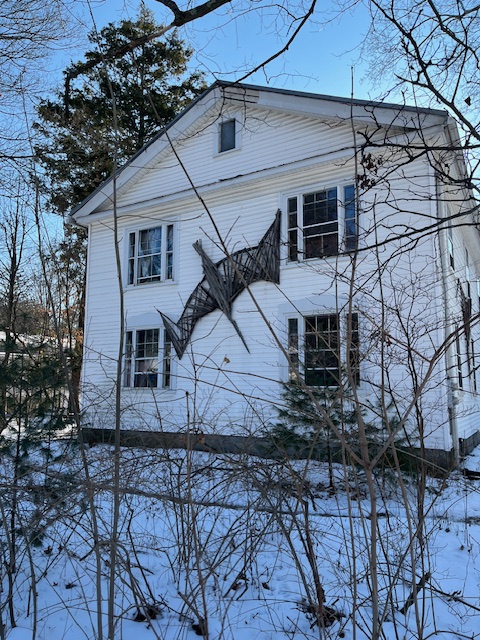Unspent Block Grant Funds Recommended for Community Land Trust Project on Amity Street

174 Amity Street; The Amherst Community Land Trust in partnership with Habitat for Humanity Pioneer Valley has proposed to renovate this property into affordable housing, Photo: Hetty Startup
Report on the Meeting of the Community Development Block Grant Committee, May 8, 2025
This meeting was held over Zoom and was recorded.
Present
Becky Michaels (Chair), Suzanne Schilling, Zoe Soulis, Andrew Hart, and Nat Larson. Staff: Walker Powell (Planner)
The Community Development Block Grant (CDBG) committee unanimously recommended that $582,000 in unspent CDBG funds from 2022 be awarded to the Amherst Community Land Trust’s (ACLT) proposal to purchase a large property at 174 Amity Street for development of five units of affordable homeownership. The property includes a large house built in the 19th century that currently has two rental units.
ACLT had applied for $500,000 of the 2025 CDBG funds in February, and was awarded $65,000 for pre-development costs. With an additional $582,000, the land trust would be able to purchase the property, do the federally mandated environmental and wetlands evaluation, obtain necessary permits, and begin to redesign the existing structure into three units for homeownership. They hope that Habitat for Humanity will construct two additional homes on the 23,000-square-foot property.
The unspent CDBG funds had been allocated for a project for Belchertown Road in 2022–2023. However, during that time period, the Department of Public Works (DPW) was already working on several other projects (funded with ARPA money) and did not have the ability to even work on the design for the Belchertown Road project. With the town in danger of losing the 2022 CDBG funds if a use was not found soon, the Planning Department invited everyone who had applied for the 2025 funds to submit proposals for the unspent CDBG funds.
The only ones to submit proposals for those funds were the town (to extend the “multi-use path” along North Pleasant Street) and the ACLT (to acquire the Amity Street property). Town Planner Walker Powell advised that both projects are costly enough to use the full amount, and rather than splitting the funds, the entire amount should be allocated to either project.
She noted that the DPW received CDBG funds in 2024 to extend the North Pleasant Street multi-use path to Fisher Street, but the additional $582,000 would not be enough to complete the new sidewalk to UMass. The existing sidewalk is narrow and in poor condition, probably not usable by those in wheelchairs. (Most bicyclists ride on the street.)
Linda Slakey, the president of ACLT, explained that the owners of 174 Amity Street — who are the three grandchildren of the family that purchased the house in the mid-20th century — had approached the town about wanting the property to be used for affordable housing. The town had referred them to ACLT. The property has been assessed at $700,000, and the family agreed to sell it to ACLT for $475,000.
Slakey said that the project is an opportunity to create an attractive and very visible cluster of affordable housing in the center of Amherst. (Note that Slakey gave a presentation to the Amherst Municipal Affordable Housing Trust on May 8 about all of ACLT’s current projects.)
She said the unspent CDBG funds would allow the land trust to acquire the property, once the required appraisals and surveys have been done, and begin the planning process to create five residential units there. The CDBG funds would not be used for construction, she said; ACLT plans to apply to other sources to finance the renovation of the main building.
CDBG Chair Becky Michaels noted that the multi-use path proposal would have a minor impact on thousands of people, while the ACLT plan would have a major impact on about 20 people. Nat Larson noted that the committee had already awarded the money to the town, which had not been able to use it, and that the Amity Street project seemed ready to go. He advised the committee to take advantage of this opportunity and the owners’ generosity. He reminded the rest of the committee that the future of the property is uncertain if ACLT does not raise the purchase amount and that there is a shortage of affordable housing in Amherst. The town, he said, can apply for the sidewalk improvements next year. Andrew Hart said the families that would occupy the homes would be an important part of the community.
Suzanne Schilling said funding the Amity Street project might send a positive message to other landowners, and lead them to think about foregoing some of their profit for similar projects. Slakey noted that in the past year, ACLT has received four other opportunities from homeowners to donate some or all of their property’s value to the land trust for affordable housing.
The vote was unanimous to allocate the remaining CDBG funds to the ACLT project. That allocation must be approved by the Town Manager.
